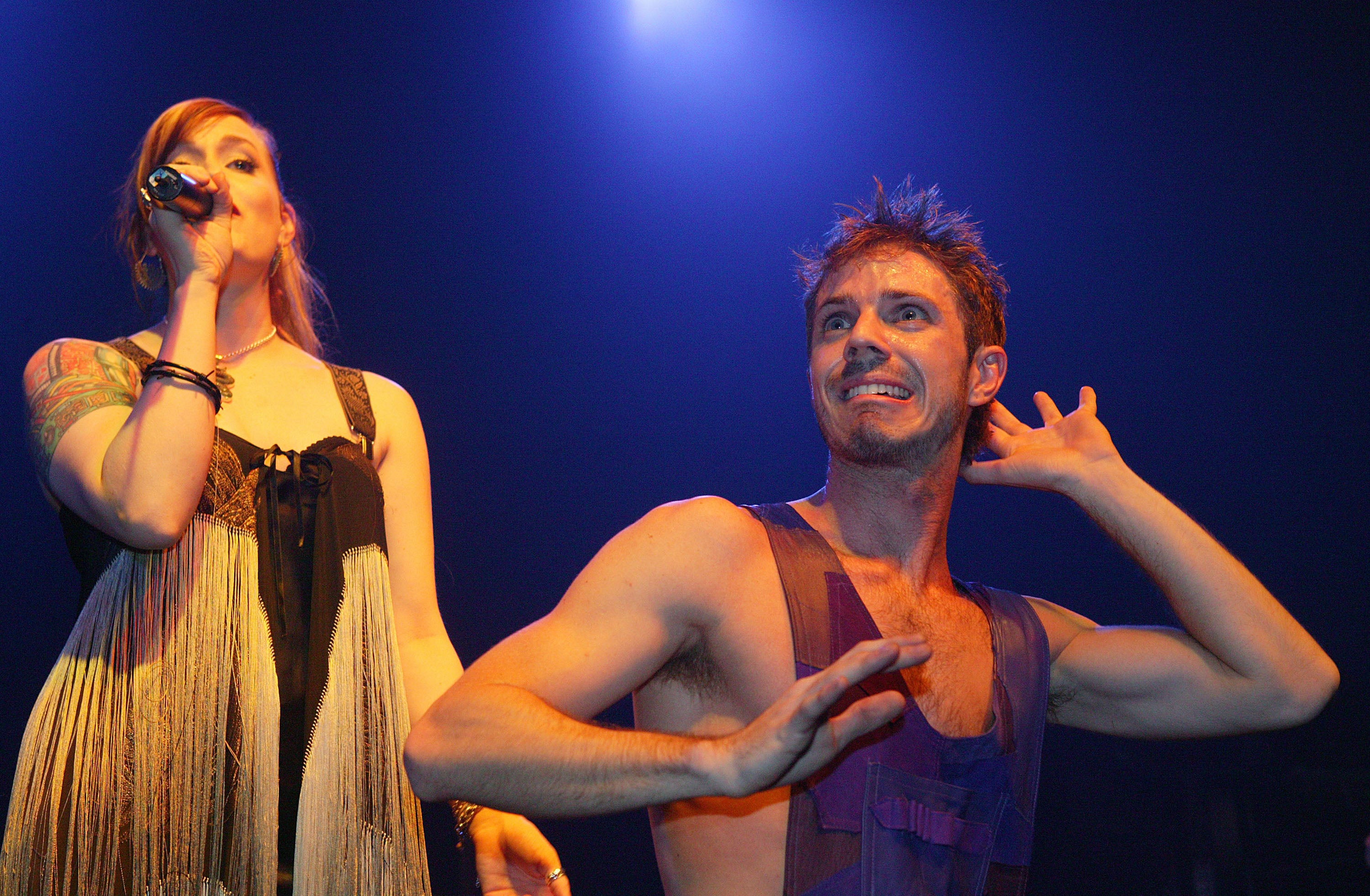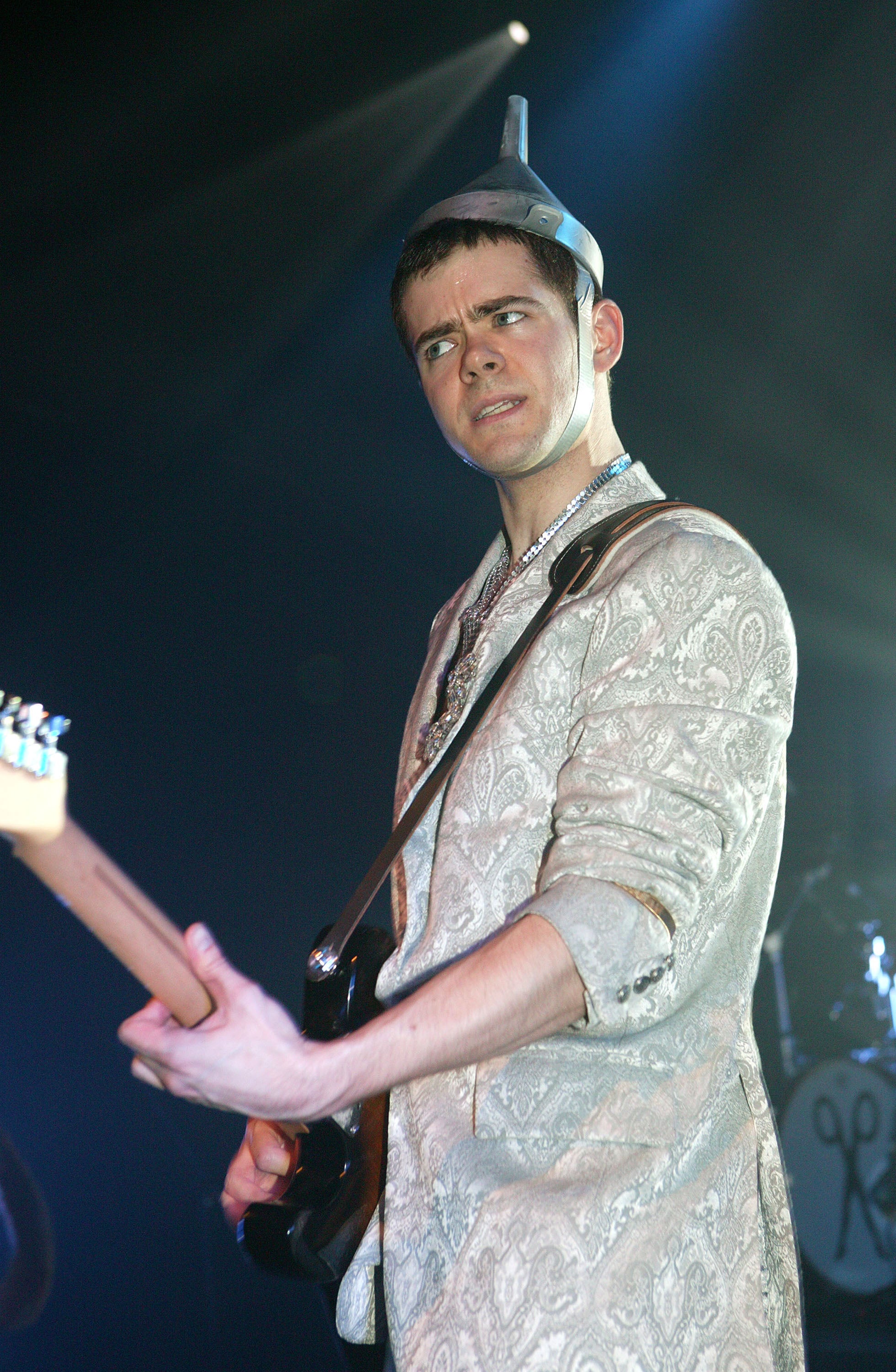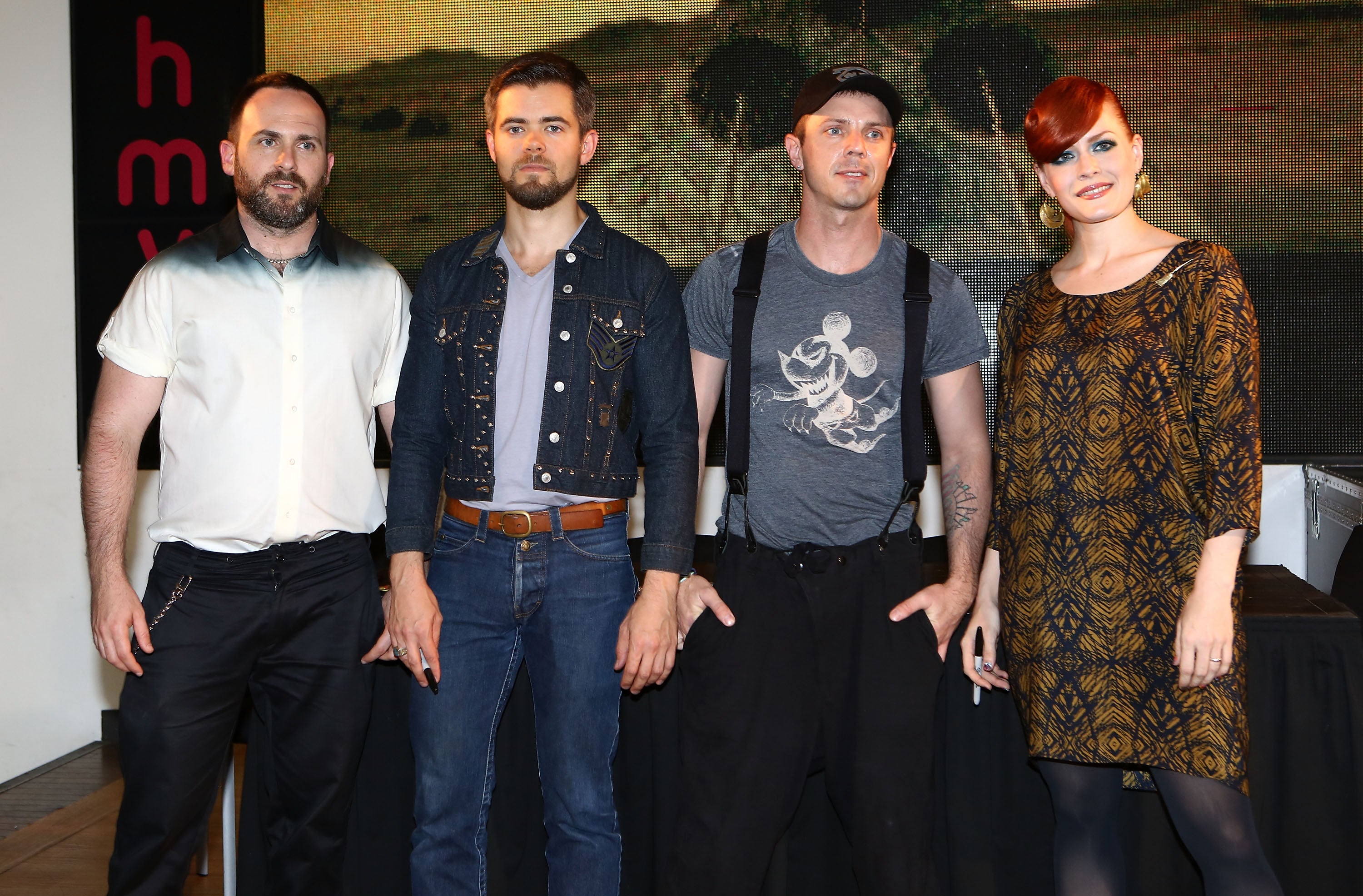Time moves fast when you’re the Scissor Sisters. It’s been 24 years since the band came alive, in the sequinned musical Petri dish of New York’s queer underground. Twenty years since their self-titled debut album tore through the UK music charts, with brash, exuberant hits such as “Filthy/Gorgeous” and “Take Your Mama”. Twelve years since they sashayed off stage for the last time, leaving behind an empty dancefloor, still vibrating to their infectious glam-pop beats. It’s only a matter of days, however, since I heard the news: the Scissor Sisters are back.
To mark the 20th anniversary of Scissor Sisters, the inimitable pop group have reformed as a trio, and are today announcing a tour of the UK and Ireland next May. The three returning members of the band – Jake Shears (aka Arizona-born singer-songwriter Jason Sellards), Babydaddy (instrumentalist and songwriter Scott Hoffman) and Del Marquis (guitarist/bassist Derek Gruen) – sit before me on Zoom. Shears is in the back of a cab, holding his phone camera aloft; Babydaddy and Marquis are in their respective homes, the latter backdropped by a wall of guitars. But in spirit, at least, they are together at last.
“I’m always a big dreamer, and I still dream big,” says Shears, in his slightly nasal West Coast twang. “I think the door is open. It could just be the 20th anniversary – or it could be the beginning of something really exciting. We’re doing it to have fun and enjoy ourselves.”
Absent from the reunion is Ana Matronic (Ana Kirby, née Lynch), the steely and charismatic singer who fronted the band alongside Shears during the original Scissor Sisters run. “I think it just didn’t line up,” says Shears. “It’s not something that she wanted to do at this moment in time. And I didn’t want that to keep us from coming out and playing these songs.” So, for now at least, it’s a reunion à trois. “Our biological clocks are ticking, after all,” says Marquis, dryly.
The Scissor Sisters’ peak was a dizzy decade of wild, camp live shows, high-profile collaborations (with Elton John, Kylie Minogue, Calvin Harris and others), TV appearances and Brit Award wins. They stormed the zeitgeist with flamboyant force; no survey of the British Noughties music scene would be complete without them. And then there’s the music itself. Spanning dance-pop, glam rock, disco and more, the Scissor Sisters sound was lively, provocative and unapologetically queer.
Before they met, the Sisters were angling for very different kinds of stardom. Shears was a go-go dancer and sometime stripper with aspirations of being a songwriter; Babydaddy was trying to write fiction; Marquis was a trained furniture designer; Ana Matronic hosted cabaret shows. (Also in the mix was drummer Paddy Boom, replaced in 2008 by Randy Real.) The band, first called Dead Lesbian and then the Fibrillating Scissor Sisters, initially comprised just Babydaddy and Shears; in the throng of the NYC music scene, the other bandmates slowly fell into their orbit.
For two years, they worked on the album that would become 2004’s Scissor Sisters. “It’s funny looking back at these songs,” says Shears, “because there’s a real sweetness and innocence to them. At the time, writing this album, we were sort of blindly optimistic about the world.”

If the band’s eccentricity and penchant for outrage made them a tough sell for the American mainstream, the UK proved all too ready to buy in. Scissor Sisters became a No 1 hit here, ultimately going platinum five times and ranking among the 10 biggest albums of the decade. “The UK has always been a place where you don’t really have to fit into something that already exists,” says Marquis. “They appreciate idiosyncrasy, and appreciate a character, a personality. If anything can be said about our band, it’s that it’s not really like any other band. We didn’t make sense anywhere else, and it’s just like we clicked here.”
In their earlier years, the band sometimes resisted being labelled a “gay band”. “At the time, we weren’t shying away from it,” says Babydaddy. “But we didn’t want to make that the focus of who we were. We wanted it to be inclusive, to feel like everyone was invited to this party. It wasn’t just a queer party, it was an everything party.”
Enjoy unlimited access to 100 million ad-free songs and podcasts with Amazon Music
Sign up now for a 4 month free trial (3 months for non-Prime members)
Enjoy unlimited access to 100 million ad-free songs and podcasts with Amazon Music
Sign up now for a 4 month free trial (3 months for non-Prime members)
“We made music for everyone and we delivered it in a package that was really fun and fruity,” says Shears. “But I always wanted the music to come first. When it didn’t feel like it was coming first, it could be frustrating for us. I had a chip on my shoulder about being, you know, thought of as like the gay band, because I wanted it to be legit. I wanted our music to be considered solid on its own merits.”

“If we ever pushed back on the gay thing, it wasn’t about being in the closet in any way,” adds Babydaddy. “We just wanted people to realise there was more there.”
Scissor Sisters was a resounding success. Three more albums followed – Ta Dah (2006), Night Work (2010) and Magic Hour (2012) – and a run of other hits, including the anthemic, almost Coldplay-esque “Fire with Fire”, and the bouncy, defiant pop banger “I Don’t Feel Like Dancin’”, which brought in Elton John on piano and marked the band’s first No 1 single in the UK.
And then, in 2012, the sisterhood came to an end. The specifics of the Scissor Sisters’ dissolution have long remained ambiguous. This wasn’t some explosive falling out. There were no Gallagher brothers onstage bust-ups, no venomous Beach Boys-style legal dispute. Shears has suggested that the band simply decided to part ways after the success of their 2012 single “Let’s Have a Kiki” – a wry and breezy, dance number that was, for once, a “phenomenon” in their native US. “I think reaching that goal, and feeling like we were in a great moment, made it feel like a great time to hang up our hats,” he says.
But was there more to it than that? In a 2021 interview with The Guardian, Shears said he wanted to apologise to his former bandmates, claiming that he “could be an absolute monster” and a “real asshole”. I mention these quotes now. Has an apology been forthcoming? “I’m looking forward to this one,” grins Hoffmann.
Ana will be in the back of our minds, for sure. But in the meantime, for the 20th anniversary, it just felt like we wanted to see what these songs do out there
Babydaddy
Shears downplays it: “I was being hyperbolic. I mean, you just learn so much over the years. I’m a very different person than I was at 23 years old. With all the pressures at the time… you know, you’re on tour, in your mid-twenties, in a scenario like this. I don’t necessarily think I made all perfect decisions.”
“He was just a regular monster,” Hoffmann jokes, then demurs. “We were all really strong personalities. It eventually felt like siblings – but there’s only so long you want to be on family vacation. You know what, I’ll say this to address the other stuff about Jake… In his defence, we are all such different personalities. We all came from really different worlds. We always had these different visions, and the band was Jake’s baby.”
After the breakup, it’s not like the bandmates spent the next dozen years sitting around and waiting for the phone to ring. Shears, who now lives in the UK, went on to enjoy a successful solo career, acting on Broadway and the West End, hosting a podcast (Queer the Music), and collaborating with Elton John again on the Olivier-winning musical Tammy Faye. Babydaddy has continued to work as a songwriter, producer and occasional composer of film and TV soundtracks. Marquis founded his own band, the pop and R&B-inflected Slow Knights. Ana Matronic, meanwhile, has worked on radio, and – in a fittingly esoteric career move – authored a book about robots.

On the matter of her absence, the remaining Sisters are somewhat vague – “It’s more her story to tell than ours,” says Babydaddy. “Except to say that, I think she’s such a part of the spirit of this band, especially at that moment in time. There were definitely conversations, and I think hopefully a good understanding of it just not being the right time. So it is a little funny [to be reuniting without her]. But also… there’s the people that want to hear this music again too.”
“Maybe there is some future where Ana comes back and does stuff too. Who knows?” adds Babydaddy. “She’ll be in the back of our minds, for sure. But in the meantime, for the 20th anniversary, it just felt like we wanted to see what these songs do out there.”
In ways both good and bad, the Scissor Sisters are stepping out into a very different scene to the one they left in 2012. “Even when we were wrapping up,” says Shears, “Instagram and TikTok weren’t really a thing. Pop music has become just as much about socials as it has the music. It’s helped queer music flourish and find an audience. But the way that people listen to music has completely changed – I personally think for the worse.”

The Sisters themselves have changed too. “My life has gotten more domestic,” admits Shears. “We’re all now in the latter half of our forties. At this point I would rather be behind the decks at a club or a party than on the dancefloor.” But some habits die harder. The Scissor Sisters’ forthcoming tour has lined up many of the nation’s biggest music venues (London’s O2 and Manchester’s Co-op Live arenas among them), yet the band are aiming to recapture the loose, anarchic energy of their heyday.
“I think chaos comes naturally to us,” says Shears. “I think errors can be the most fun parts. Errors and flaws and imperfections are sort of the core of show business – figuring out on the fly how to overcome certain moments, when something goes wrong or I fall flat on my face on stage. A big part of showmanship is how you solve problems in real time.”
“I don’t think we’re gonna be able to escape some element of chaos in these shows,” adds Babydaddy, “because we’re still figuring it out. We may still be figuring it out on the day of the show.” It’s good to have them back. Chaos or no chaos, I, for one, feel like dancing.
Tickets for the Scissor Sisters 2025 tour will go on pre-sale on Wednesday 6th November at 9am, with the general on sale Friday 8th November at 9am, all via www.scissorsisters.com

